本试题 “短文改错。 Three young pioneers were playing while they saw a young tree bending to one side with some of it's leaves falling. They felt sadness an...” 主要考查您对可数名词及其单复数
物主代词
关系代词
形容词
介词和介词短语
从属连词
动词的过去式
动词
过去分词
非限制性定语从句
等考点的理解。关于这些考点您可以点击下面的选项卡查看详细档案。
- 可数名词及其单复数
- 物主代词
- 关系代词
- 形容词
- 介词和介词短语
- 从属连词
- 动词的过去式
- 动词
- 过去分词
- 非限制性定语从句
可数名词:
是指能以数目来计算,可以分成个体的人或东西;因此它有复数形式,当它的复数形式在句子中作主语时,句子的谓语也应用复数形式。
可数名词复数的规则变化:
| 情况 | 构成方法 | 读音 | 例词 |
| 一般情况 | 加 –s | 1.清辅音后读/s/; 2.浊辅音和元音后读/z/; |
map-maps bag-bags car-cars |
| 以s,sh,ch,x等结尾的词 | 加 -es | 读 /iz/ | bus-buses watch-watches |
| 以ce,se,ze,(d)ge等结尾 的词 |
加 -s | 读 /iz/ | license-licenses |
| 以辅音字母+y结尾的词 | 变y 为i再加es | 读 /z/ | baby-babies |
1)以y 结尾的专有名词,或元音字母+y结尾的名词变复数时,直接加s变复数:
如:two Marys the Henrys monkey---monkeys holiday---holidays
比较:层楼:storey---storeys story---stories
2)以o 结尾的名词,变复数时:
a. 加s,如: photo---photos piano---pianos
b. 加es,如:potato--potatoes tomato--tomatoes
c. 均可,如:zero---zeros / zeroes
3)以f或fe 结尾的名词变复数时:
a. 加s,如: belief---beliefs roof---roofs safe---safes gulf---gulfs;
b. 去f, fe 加ves,如:half---halves knife---knives leaf---leaves wolf---wolves wife---wives life---lives thief---thieves;
c. 均可,如:handkerchief: handkerchiefs / handkerchieves
可数名词复数的不规则变化:
1)child---children foot---feet tooth---teeth mouse---mice man---men woman---women
注意:与 man 和 woman构成的合成词,其复数形式也是 -men 和-women。
如:an Englishman,two Englishmen. 但German不是合成词,故复数形式为Germans;Bowman是姓,其复数是the Bowmans。
2)单复同形 如:
deer,sheep,fish,Chinese,Japanese
li,jin,yuan,two li,three mu,four jin
但除人民币元、角、分外,美元、英镑、法郎等都有复数形式。如:
a dollar, two dollars; a meter, two meters
3)集体名词,以单数形式出现,但实为复数。
如:staff people police cattle 等本身就是复数,不能说a staff a people,a police,a cattle,
但可以说a person,a policeman,a head of cattle, the English,the British,the French,the Chinese,the
Japanese, the Swiss 等名词,表示国民总称时,作复数用。
如:The Chinese are industries and brave. 中国人民是勤劳勇敢的。
4)以s 结尾,仍为单数的名词,如:
a. maths,politics,physics等学科名词,为不可数名词,是单数。
b. news 是不可数名词。
c. the United States,the United Nations 应视为单数。
The United Nations was organized in 1945. 联合国是1945年组建起来的。
d. 以复数形式出现的书名,剧名,报纸,杂志名,也可视为单数。
"The Arabian Nights" is a very interesting story-book.
<<一千零一夜>>是一本非常有趣的故事书。
5) 表示由两部分构成的东西,如:glasses (眼镜) trousers, clothes ;
若表达具体数目,要借助数量词 pair(对,双); suit(套); a pair of glasses; two pairs of trousers
6)另外还有一些名词,其复数形式有时可表示特别意思,如:goods货物,waters水域,fishes(各种)鱼
复合名词的复数形式:
名词作定语名词作定语一般用单数,但也有以下例外。
1)用复数作定语。
如:sports meeting 运动会
students reading-room 学生阅览室
talks table 谈判桌
the foreign languages department 外语系
2)man, woman, gentleman等作定语时,其单复数以所修饰的名词的单复数而定。
如:men workers
women teachers
gentlemen officials
3)有些原有s结尾的名词,作定语时,s保留。
如:goods train (货车)
arms produce 武器生产
customs papers 海关文件
clothes brush衣刷
4)数词+名词作定语时,这个名词一般保留单数形式。
如:two-dozen eggs 两打/(二十四个鸡蛋)
a ten-mile walk 十里路
two-hundred trees 两百棵树
a five-year plan 一个五年计划
可数名词单复数知识体系:

不同国籍人的单复数:
国籍
总称(谓语用复数)
单数
复数
中国人
the Chinese
a Chinese
two Chinese
瑞士人
the Swiss
a Swiss
two Swiss
澳大利亚人
the Australians
an Australian
two Australians
俄国人
the Russians
a Russian
two Russians
意大利人
the Italians
an Italian
two Italians
希腊人
the Greek
a Greek
two Greeks
法国人
the French
a Frenchman
two Frenchmen
日本人
the Japanese
a Japanese
two Japanese
美国人
the Americans
an American
two Americans
印度人
the Indians
an Indian
two Indians
加拿大人
the Canadians
a Canadian
two Canadians
德国人
the Germans
a German
two Germans
英国人
the English
an Englishman
two Englishmen
瑞典人
the Swedish
a Swede
two Swedes
物主代词的概念:
表示所有关系的代词叫物主代词。
物主代词有两种形式:一种是形容词性物主代词,在句中只能充当定语;另一种是名词性物主代词,和名词用法相同,在句中作主语、宾语、表语等。
物主代词的特性:
1、物主代词既有表示所属的作用又有指代作用。
例如:John had cut his finger;约翰割破了手指。
物主代词有形容词性(my,your等)和名词性(mine,yours等)两种,形容词性的物主代词属于限定词。
名词性的物主代词在用法上相当于省略了中心名词的“'s”属格结构,
如:Jack's cap 意为 The cap is Jack's.
His cap 意为 The cap is his.
2、名词性物主代词的句法功能:
a.作主语,例如:May I use your pen? Yours works better.
b.作宾语,例如:I love my motherland as much as you love yours.
c.作介词宾语,例如:Your should interpret what I said in my sense of the word,not in yours.
d.作主语补语,例如:The life I have is yours. It's yours. It's yours. 我的生命属于你,属于你,属于你。
物主代词的基本形式:
|
第一人称 |
第二人称 |
第三人称 | ||||
|
|
|
名词性 |
形容词性 |
名词性 |
形容词性 |
名词性 |
|
单数 |
my |
mine |
your |
yours |
his |
his |
|
复数 |
our |
ours |
your |
yours |
theirs | |
形容词性物主代词的用法:
1、形容词性物主代词通常修饰名词,作定语。
如:We should treat her mother very well.
2、与own连用表示强调。
如:I saw it with my own eyes.
名词性物主代词的用法:
1、名词性物主代词可作主语、表语和宾语。
如:This is my desk. Yours is over there.
2、名词性物主代词常用于双重属格,于of连用。
如:This girl is a friend of mine.
物主代词知识体系:
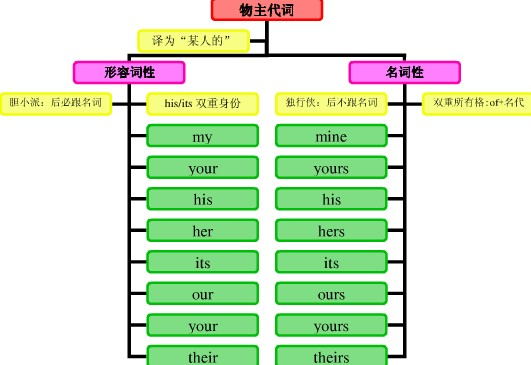
物主代词特别用法:
1、名词性和形容词性物主代词不能混用。
如:Jack has a low opinion of Sue.
2、物主代词的单复数必须和它所指代的名词一致。
如:His idea is to do more practice every day.
3、对于anyone,anybody,everyone,everybody,应根据上下文来判断his或her,有时也可用their。
如:Has everyone finished their work?
关系代词的概念:
英语中的关系代词有who, whom, whose, that, which, 它们是用来引导定语从句的。关系代词既代表定语从句所修饰的词,又在其所引导的从句中承担一个成分,如主语、宾语、表语、或定语。
如:This is the man who saved your son. (who在从句中作主语,先行词是man)
The man whom I met yesterday is Jim.
A child whose parents are dead is an orphan.
He wants a room whose window looks out over the sea.
关系代词用法:
1、that与which的用法区别:
两者都可指物,常可互换。其区别主要在于:
(1)引导非限制性定语从句时,通常要用which:
如:She received an invitation from her boss, which came as a surprise. 她收到了老板的邀请,这是她意想不到的。
(2)直接放在介词后作宾语时,通常要用which:
如:The tool with which he is working is called a hammer. 他干活用的那个工具叫做锤子。
(3)当先行词是下列不定代词或被它们修饰时much, little, none, all, few, every(thing), any(thing), no(thing)等时,通常用that:
如:There was little that the enemy could do but surrender. 敌人无法,只有投降了。
All[Everything] that can be done must be done. 凡能做的事都必须做。
(4)当先行词有the very, the only, the same等修饰时,通常用that:
如:This is the only example that I know. 我知道的例子只有这一个。
Those are the very words that he used. 那是他的原话。
(5)当先行词有形容词最高级或序数词(包括last, next等)等修饰时,通常用that:
如:This is the best dictionary that I've ever used. 这是我用过的最好的词典。
The first thing that you should do is to work out a plan. 你应该做的第一件事是订个计划。
(6)当关系代词在定语从句中用作表语时,通常用that:
如:China is not the country(that) it was. 中国已不是过去的中国了。
(7)当先行词是一个既指人又指物的并列词组时,通常用that:
如:They talked about the persons and things that most impressed them. 他们谈论了使他们印象最深的人和事。
(8)当要避免重复时:
如:Which is the course that we are to take? 我们选哪门课程?
2、that与who的用法区别:
(1)两者均可指人,有时可互换:
如:All that[who] heard him were delighted. 所有听了他讲话的人都很高兴。
Have you met anybody that[who] has been to Paris? 你遇见过到过巴黎的人吗?
He is the only one among us that[who] knows Russian. 他是我们中间唯一懂俄语的人。
(2)但是在下列情况,通常要用that:
①当先行词是一个既指人又指物的并列词组时:
如:I made a speech on the men and things that I had seen abroad. 我就我在国外所见到的人和事作了报告。
②当先行词是who时(为避免重复):
如:Who was it that won the World Cup in1982? 谁赢得了1982年的世界杯?
③当关系代词在定语从句中作表语时(可省略):
如:Tom is not the boy(that) he was. 汤姆这孩子已不是以前那个样子了。
关系代词知识体系:
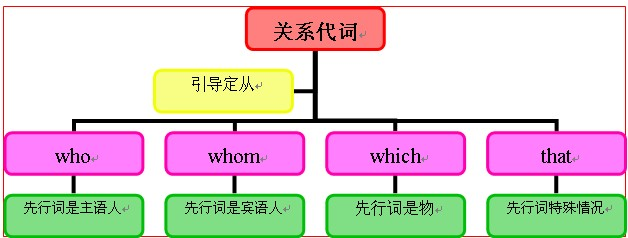
关系代词用法拓展:
1、as与which的用法区别:
(1)引导限制性定语从句时,在such,as,thesame后只能用as,其他情况用which:
如:I never heard such stories as he tells. 我从未听过他讲那样的故事。
It's the same story as I heard yesterday. 这故事跟我昨天听到的一样。
This is the photo which shows my house. 这张照片拍的是我的住宅。
(2)引导非限制性定语从句时,有时两者可互换:
如:I live a long way from work, as [which] you know. 我住得离工作单位很远,这你是知道的。
(3)但在,在以下情况引导非限制性定语从句时,两者不可换用:
①当从句位于主句前面时,只用as:
如:As is known to everybody, the moon travels round the earth once every month. 月球每月绕地球转一周,这是每个人都清楚的。
②as引导的非限制性定语从句应与主句在意义上和谐一致,which无此限制:
如:He went abroad, as[which] was expected. 他出国了,这是大家预料到的。
He went abroad, which was unexpected. 他出国了,这让大家感到很意外。(不用as)
③as引导非限制性定语从句时,先行词通常不能是主句中某个具体的词,而应是整个句子、整个短语或某个短语推断出来的概念,而which则无此限制:
如:The river, which flows through London, is called the Thames. 这条流经伦敦的河叫泰晤士河。(不用as)
④当as引导非限制性定语从句作主语时,其谓语通常应是连系动词,而不宜是其他动词,而which则无此限制:
如:She has married again, as[which] seemed natural. 她又结婚了,这似乎很自常。
She has married again, which delighted us.她又结婚了,这使我们很高兴。(不用as)
2、who与whom的用法区别:
两者均只用于人,从理论上说,who为主格,whom为宾格:
如:Where's the girl who sells the tickets? 卖票的女孩在哪里?
The author whom you criticized in your view has written a letter in reply. 你在评论中批评的那个作者已写了一封回信。
但实际上,除非在正式文体中,宾格关系代词whom往往省略不用,或用who或that代之:
如:The man(that, who, whom) you met just now is called Jim. 你刚遇见的那个人叫吉姆。
不过,在以下几种情况值得注意:
(1)直接跟在介词后面作宾语时,只能用whom,而且不能省略:
如:She brought with her three friends, none of whom I had ever met before. 她带了3个朋友来,我以前都没见过。
(2)引导非限制性定语从句且作宾语时,who和whom均可用,但以用whom为佳,此时也不能省略:
如:This is Jack, who[whom] you haven't met before. 这是杰克,你以前没见过。
形容词的概念:
形容词(adjective),简称adj.或a,形容词用来修饰名词或代词,表示人或事物的性质、状态,和特征的程度好坏与否,形容词在句中作定语、表语、宾语补足语。通常,可将形容词分成性质形容词和叙述形容词两类,其位置不一定都放在名词前面。
形容词的作用与位置:
形容词是用来修饰名词的,常被放在名词前作定语,或放在系动词后面作表语。以下属几种特殊情况,须牢记;
(1)形容词短语作定语,定语后置。
如:a language difficult to master,
a leaning tower about 180 feet high
(2)表语形容词(afraid、alike、alone、asleep、awake、alive等)作定语,定语后置。如a man alive。有些表身体健康状况的形容词如well、faint、ill只作表语。sick既可作表语又可作定语,ill如作定语意为“bad”。
(3)用作定语,修饰由不定代词one、no、any、some和every构成的复合词如anything、something等时,通常后置。
如:I have something important to tell you.
(4)else常用作疑问代词和不定代词的后置定语。
(5)enough、nearby修饰名词前置或后置,程度副词一般位于形容词、副词前面,enough修饰形容词、副词时,必须后置。
(6)几个并列的形容词作定语,其语序通常为:限定语(The、A)+描绘性形容词+size(大小)+shape(形状)+age(年龄、时间)+color(颜色)+origin(国籍、来源)+material(材料)+purpose(目的)+名词。
口诀:
限定描绘大长高,形状年龄和新老;颜色国籍跟材料,作用类别往后靠。
如:a heavy black Chinese steel umbrella,
the man's first tow interesting little red French oil paintings
形容词的用法:
1、形容词修饰名词,说明事物或人的性质或特征。通常,可将形容词分成性质形容词和叙述形容词两类,其位置不一定都放在名词前面:
1)直接说明事物的性质或特征的形容词是性质形容词,它有级的变化,可以用程度副词修饰,在句中可作定语、表语和补语。例如:hot热的。
2)叙述形容词只能作表语,所以又称为表语形容词。这类形容词没有级的变化,也不可用程度副词修饰。
大多数以a开头的形容词都属于这一类。例如:
afraid害怕的。(错)Heisanillman. (对)Themanisill. (错)Sheisanafraidgirl. (对)Thegirlisafraid.
这类词还有:well,unwell,ill,faint,afraid,alike,alive,alone,asleep,awake等。
3)形容词作定语修饰名词时,要放在名词的前边。但是如果形容词修饰以-thing为字尾的词语时,要放在这些词之后。例如:somethingnice
2、用形容词表示类别和整体:
1)某些形容词加上定冠词可以泛指一类人,与谓语动词的复数连接。如:the dead,the living,the rich,the poor,the blind,the hungry The poorarelosinghope.穷人失去了希望。
2)有关国家和民族的形容词加上定冠词指这个民族的整体,与动词的复数连用。如:the British,the English,the French,the Chinese. The English have wonderful senseofhumor.
以-ly结尾的形容词:
1)大部分形容词加-ly可构成副词。但friendly,deadly,lovely,lonely,likely,lively,ugly,brotherly,仍为形容词。改错:
如:(错)She sang lovely.
(错)He spoke to me very friendly.
(对)Her singing was lovely.
(对)He spoke to me in a very friendly way.
2)有些以-ly结尾既为形容词,也为副词。 daily,weekly,monthly,yearly,early .
如:The Times is a daily paper.
The Times is published daily.
形容词知识体系:
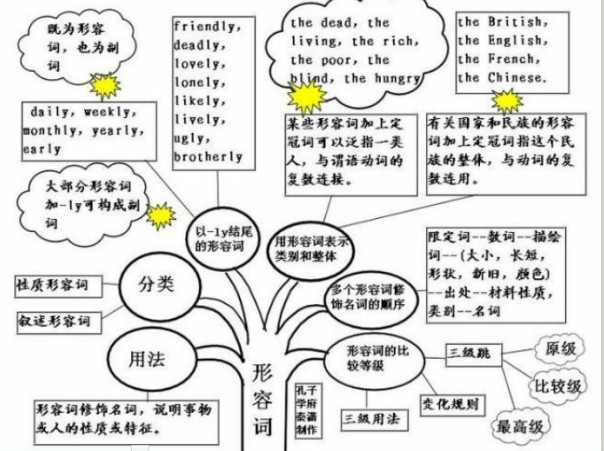
复合形容词的构成:
(1)形容词+名词+ed:
如:kind-hearted 好心的,white-haired 白发的
(2)形容词+形容词:
如:red-hot 炽热的,dark-blue 深蓝的
(3)形容词+现在分词:
如:good-looking 好看的,easy-going 随和的
(4)副词+现在分词:
如:hard-working 勤劳的,fast-moving 快速转动的
(5)副词+过去分词:
如:hard-won 得来不易的,newly-made 新建的
(6)名词+形容词:
如:life-long 终生的,world-famous 世界闻名的
(7)名词+现在分词:
如:peace-loving 爱好和平的,fun-loving 爱开玩笑的
(8)名词+过去分词:
如:snow-covered 白雪覆盖的,hand-made 手工的
(9)数词+名词+ed:
如:four-storeyed 4层楼的,three-legged 3条腿的
(10)数词+名词(名词用单数):
如:ten-year 10年的, two-man 两人的
介词和介词短语的概念:
介词是一种用来表示词与词、词与句之间的关系的虚词,在句中不能单独作句子成分。介词后面一般有名词、代词或相当于名词的其他词类,短语或从句作它的宾语。介词和它的宾语构成介词词组,在句中作状语,表语,补语或介词宾语。介词可以分为时间介词、地点介词、方式介词和其他介词。
误用介词的三种情况:
1、多用介词:
多用介词可能是受汉语意思的影响将及物动词误用作不及物动词,也可能是受相关结构的影响而用错:
误:We discussed about the plan.
正:We discussed the plan. 我们讨论了计划。
误:Did he mention about the accident?
正:Did he mention the accident? 他提到那次事故了吗?
误:I saw her enter into the bank.
正:I saw her enter the bank. 我看见她进了银行。
误:He married with[to] a nurse.
正:He married a nurse. 他同一位护士结了婚。
误:How can contact with you?
正:How can contact you? 我怎么与你联系?
误:We should serve for the people heart and soul.
正:We should serve the people heart and soul. 我们应该全心全意地为人民服务。
误:Who controls over the factory? (但名词control可接over)
正:Who controls the factory? 谁管理这个工厂?
误:He has a great many of friends here. (比较a great number of)
正:He has a great many friends here. 他在这儿有很多朋友。
2、漏用介词:
漏用介词可能是受汉语意思的影响将不及物动词误用作及物动词,或是受相关结构的影响的影响而用错等:
误:This matter is difficult to deal. (deal with=处理)
正:This matter is difficult to deal with. 这事很难处理。
误:He is not a man to be depended.
正:He is not a man to be depended on. 他不是个可靠的人。
误:He took a cup of tea, and went on the story.
正:He took a cup of tea, and wentonwiththestory.他喝了一口茶,又接着讲故事。
误:My mother still regards me a child. (比较consider…as中的as可省略)
正:My mother still regards me as a child. 我母亲还把我当小孩看。
误:They insisted sending a car over to fetch us.
正:They insisted on sending a car over to fetch us.他们坚持要派车来接我们。
误:What he says is worth listening.
正:What he said is worth listening to.他的话值得一听。
3、错用介词:
错用介词的情况比较复杂,可能是因受汉语意思的而错,也可能是因弄不清搭配关系而错,可能是混淆用法而错,也可能是受相关结构的影响而错,可能是忽略语境而错,也可能是想当然的用错:
误:She called on his office yesterday. (call on+人,call at+地点)
正:She called at his office yesterday. 她昨天去了他办公室拜访。
误:He is engaged with a nurse.
正:He is engaged to a nurse.他与一位护士订了婚。
误:The sun rises from the east.
正:The sun rises in the east.太阳从东方升起。
误:Under his help, I finished it in time.
正:With his help, I finished it in time. 在他的帮助下,我及时做完了。
误:During he was in Japan, he visited many places.
正:During his stay in Japan, he visited many places.他在日本期间,参观过许多地方。
误:We are familiar to his character.
正:We are familiar with his character.我们了解他的性格。
误:Help yourself with the fruit.
正:Help yourself to the fruit.吃点水果吧。
介词的宾语:
1、名词或代词作介词宾语:
如:Are you interested in history? 你对历史感兴趣吗?
Don't worry about it. 别为它担心。
注:若是人称代词用作介词宾语,要注意用宾格。
如:No one can sing like her. 没有人能像她那样唱歌。(不能用like she)
2、动名词作介词宾语:
如:He is good at telling stories. 他善于讲故事。
In crossing the street he was run over. 他在穿过马路时被汽车撞倒。
3、过去分词作介词宾语:
如:We can't regard the matter as settled. 我们不能认为这事已经解决。
I take it for granted you have read the book. 我以为你读过这本书。
注:过去分词用作介词宾语通常只见于某些固定结构中,如上面第1句涉及regard…as(认为…是)结构,第2句涉及take sth for granted(认为某事属实)。在其他情况下,介词后通常不直接跟过去分词作宾语,若语义上需要接过去分词(表被动),可换用“being+过去分词”:
如:He went out without being seen by the others.他出去了,没有被其他人看见。
4、从句作介词宾语:
如:He was not satisfied with what she said. 他对她说的不满意。
I'm worried about where he is. 我担心他上哪儿去了。
注:介词后通常不接that从句,遇此情况需考虑用其他结构:
误:He paid no attention to that she was poor.
正:He paid no attention to the fact that she was poor. 他根本不注意她很穷这一事实。
但有个别介词(如except)可接that从句。
比较:I know nothing about him except that he lives next door./I know nothing about him except for the fact that he lives next door. 我只知道他住在隔壁,其它的就不知道了。
5、不定式作介词宾语:
如:I had no choice but to wait. 除了等,我没有别的选择。
He wanted nothing but to stay there. 他只想留在那儿。
They did nothing but complain. 他们老是一个劲地抱怨。
He never did anything but watch TV. 除了看电视,他从不干任何事。
注:(1)介词后接不定式的情形通常只见于but, except等极个别个词。该不定式有时带to,有时不带to,其区别是:若其前出现了动词do,其后的不定式通常不带to;
若其前没有出现动词do,则其后的不定式通常带to。
(2)介词后虽然通常不直接跟不定式作宾语,但却可接“连接代词(副词)+不定式”结构:
如:He gave me some advice on how to do it. 对于如何做这事他给我提了些建议。
6、形容词作介词宾语:
如:Her pronunciation is far from perfect. 她的语音远不是完美的。
In short, we must be prepared. 总而言之,我们要有准备。
Things have gone from bad to worse. 事情越来越糟。
注:(1)有些形容词用作介词宾语可视为其前省略了动名词being:
如:He regarded the situationas(being) serious. 他认为形势严重。
His work is far from(being) satisfactory. 他的工作丝毫不令人满意。
(2)有些“介词+形容词”的结构已构成固定搭配:in full全部地,全面地,无省略地; in private私下地,秘密地; in particular特别地;in general一般地,通常地,概括地; in brief 简言之;in short总之,简言之; in vain徒然地,徒劳无益地;for fee免费地,无偿地; for certain肯定地,确切地;for sure肯定地,确切地; for short为了简短,简称;atl arge自由自在地,逍遥法外; by far…得多
7、副词作介词宾语:
如:I can't stay for long. 我不能久呆。
It's too hot in here. 这里面太热了。
I looked every where except there. 除了那儿,我到处都看过了。
8、数词作介词宾语:
如:The city has a population of four million. 这座城市有四百万人口。
He was among the first to arrive. 他是第一批到的。
9、介词短语作介词宾语:
如:Choose a book from among these. 从这些书中选一本吧。
I saw her from across the street. 我从街的对面望见了她。
注:通常可后接介词短语作宾语的介词是from, till, until, since, except, instead of等。
比较:I took it from the bed. 我从床那儿(或床上)拿的。
I took it from under the bed. 我从床下拿的。
10、复合结构用作介词宾语:
如:She had no objection to Mary marrying him. 她不反对玛丽与他结婚。
She came in with a book in her hand. 她手里拿着一本书走了进来。
All the afternoon he worked with the door locked. 整个下午他都锁着门在房里工作。
介词短语的句法功能:
1、表语:
如:He was with a friend. 他和一个朋友在一起。
Health is above wealth. 健康胜过财富。
This knife is for cutting bread. 这把小刀是用于切面包的。
注:有些介词(如because of)引出的短语通常只用作状语,不用作表语:
误:His absence is because of the rain.
正:His absence is due to the rain. 他因雨未来。
但是,若主语是代词(不是名词),becauseof引出的短语可用作表语:
如:It is because of hard work. 那是因为辛苦工作的原因。
2、状语:
如:Don't touch it with your hands. 别用手去摸它。
Did you do this by design or by accident? 你这样做是有意的还是无意的?
3、定语:
如:This is his reply to your letter. 这是他给你的回信。
This is the best way of doing it. 这是做此事最好的方法。
My love for you is deeper than the sea. 我对你的爱比海深。
4、宾语补足语:
如:I found everythingin good condition. 我发现一切正常。
Her illness kept her in bed for a week. 她因生病在床上躺了一星期。
注:用作宾语补足语的介词短语在相应的被动语态中则为主语补足语:
如:He was regarded as a hero. 他被看成是英雄。
5、宾语:
如:A man stepped out from behind the wall. 一个人从墙后走出来。
He cannot spare anytime except on Sunday. 除星期日外,他抽不出时间。
6、主语:
如:Between6 and 7 suits me. 六点到七点对我比较适合。
After the exams is the time to relax. 考试后是轻松一下的时间。
注:介词短语通常不用作主语,尽管有时也像上面这样用作主语,但通常可视为是在一定的上下文中有所省略:
如:—When are we going to have the next meeting? 我们下次什么时候见面?
—On Tuesday may be convenient. 星期二可能比较方便。
此句中onTuesday虽用作主语,但可视为是其前省略了meeting一词:
即:Meeting during the vacation may be convenient.
从属连词的概念:
连词用于引导从句以形成句子的一部分或修饰句子的构成要素的叫作从属连词。
英语从属连词用法分类详解:
1、引导时间状语从句的从属连词:
(1)表示“当…时候”或“每当”的时间连词。主要的when, while, as, whenever:
如:He jumped up when the phone rang. 电话铃响时他吓了一跳。
We listened while the teacher read. 老师朗读时我们听着。
The phone rang just as I was leaving. 我正要离开,电话铃就响了起来。
(2)表示“在…之前(或之后)”的时间连词。主要的有before, after:
如:Turn the lights off before you leave. 离开前请关灯。
He started the job soon after he left the university. 他大学毕业后就开始做这份工作。
(3)表示“自从”或“直到”的时间连词。主要的有since, until, till:
如:He has lived here since he got married. 他结婚后就一直住在这儿。
Most men worked until[till] they're 65. 大多数男人工作到65岁。
(4)表示“一…就”的时间连词。主要的有as soon as, the moment, the minute, the second, the instant, immediately, directly, instantly, once, no sooner…than, hardly…when等:
如:Tell him the news as soon as you see him. 你一见到他就把这消息告诉他。
I recognized her the moment(that) I saw her. 我一看到她就认出她来了。
I want to see him the minute(that) he arrives. 他一到来我就要见他。
I went home directly I had finished work. 我一干完活就回家了。
Once he arrives, we can start. 他一来我们就可以开始。
(5)表示“上次”、“下次”、“每次”等的时间连词。主要的有every time(每次),each time(每次),(the) next time(下次),any time(随时),(the) last time(上次),the first time(第一次):
如:Last time I saw him, he looked ill. 上次我见到他的时候,他好像有病。
Next time you're in London come and visit us. 你下次来伦敦过来探望我们。
Do look me up next time you're in London. 你下次到伦敦来,一定来找我。
Every time I call on him, he is out. 我每次去访问他,他都不在。
You can call me any time you want to. 你随时都可以给我打电话。
【注】every time,each time,any time前不用冠词,(the)next time, (the)last time中的冠词可以省略,而the first time中的冠词通常不能省略。
2、引导条件状语从句的从属连词:
这类连词主要有if, unless, as[so] long as, incase等:
如:If anyone calls tell them I'm not at home. 要是有人打电话来,就说我不在家。
You will fail unless you work hard. 你若不努力就会失败。
As[So] long as you need me, I'll stay. 只要你需要我,我就留下。
In case I forget, please remind me about it. 万一我忘记,请提醒我一下。
【注】在条件状语从句中,通常要用一般现在时表示将来意义,而不能直接使用将来时态。不过,有时表示条件的if之后可能用will,但那不是将来时态,而是表示意愿或委婉的请求(will为情态动词):
如:If you will wait a moment, I'll fetch the money. 请等一下,我就去拿钱。
3、引导目的状语从句的从属连词:
主要有in order that, so that, in case, for fear等:
如:We used the computer in order that we might save time. 我们使用计算机是为了节约时间。
Speak clearly so that they may understand you. 说清楚,以便让他们能明白你的意思。
Be quiet in case you should wake the baby. 安静些,免得把婴儿吵醒。
He is working hard for fear he should fail. 他努力工作以免会失败。
4、引导结果状语从句的从属连词:
主要的有so that, so…that, such…that等:
如:We're all here now, so that the meeting can begin at last. 我们现在都到齐了,终于能开会了。
It's so difficult a question that none of us can answer it. 那是一个很难的问题,我们没有一个人能回答。
He shut the window with such force that the glass broke. 他关窗户用力很大,结果玻璃震破了。
【注】so that中的that在口语中通常可以省略。
5、引导原因状语从句的从属连词:
主要的有because, as, since, seeing(that), now(that), considering(that)等:
如:He couldn't got to school because he had a cold. 他因患感冒而未能去上学。
Since everybody is here, let's begin our discussion. 大家都到了,我们就开始吧。
Seeing that it is 8o'clock, we'll wait no longer. 由于时间已到8点,我们将不再等了。
Now that you are here, you'd better stay. 你既然来了,最好还是留下吧。
6、引导让步状语从句的从属连词:
主要有although, though, eventhough, even if, while, however, whatever, whoever, whenever, wherever等:
如:Although[Though] he is poor, he is well contented. 他虽穷却能知足常乐。
Though[Even though] it's hard work, I enjoy it. 尽管是苦活,但我乐意干。
Even if you don't like wine, try a glass of this. 即使你不喜欢喝酒,也尝尝这杯吧。
7、引导方式状语从句的从属连词:
主要有as, like, as if, as though, the way等:
如:Do it as[like] he does. 像他那样做。
He behaved as if nothing had happened. 他装作若无其事的样子。
They treat me as though I were a stranger. 他们待我如陌生人。
Nobody else loves you the way(=as) I do.没有人像我这样爱你。
8、引导地点状语从句的从属连词:
主要有where, wherever, everywhere等:
如:There were lots of parks where I lived. 我住的地方有许多公园。
Sit wherever you like. 你想坐在那儿就坐在那儿。
Everywhere they went, they were warmly welcomed. 他们每到一个地方都受到热烈欢迎。
9、引导比较状语从句的从属连词:
主要有than和as…as:
如:It's easier than I thought. 这比我想像的要容易。
They are as often wrong as they are right. 他们错对各半。
10、引导名词性从句的从属连词:
主要有that, if, whether:
如:It is clear enough what he meant. 他是什么意思很清楚。
Your greatest fault is that you are careless. 你最大的缺点是粗心大意。
Whether it will do us harm remains to be seen.是否对我们有害还要看一看。
She didn't say if he was still alive. 她没说他是否还活着。
从属连词知识体系:
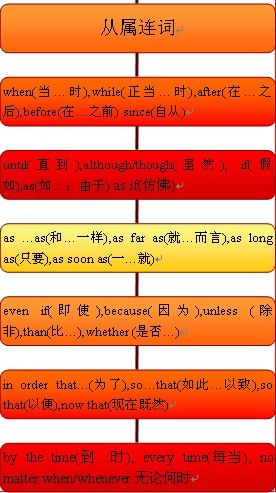
用作从属连词的六类名词结构:
英语中有些名词结构可用作从属连词,用以引导状语从句,且主要是时间状语从句。这类结构归纳起来有以下六类:
一、the+瞬间名词:
其中的瞬间名词主要包括moment, minute, instant, second等,其意为“一……就……”,相当于as soon as。
如:The minute he saw her he fell in love. 他对她一见倾心。
Telephone me the moment(that) you get the results. 你一有结果,马上给我打电话。
I was so tired that I fell asleep the instant I closed my eyes. 我很累,一合上眼就睡着了。
Sheputdownthereceiverthesecondsherecognizedmyvoice.她一听出是我的声音,马上就放下电话听筒。
注:其中的瞬间名词后可接that,也可省略。另外,有的个别副词(如directly/immediately等)也可表示类似意思。
如: Immediately the meal was over,he switchedon the radio.饭一吃完他就把收音机打开。
二、the+季节名词:
其中的季节名词包括spring,summer,autumn,winter,其意为“在……的那年春天、夏天、秋天、冬天。
如:His wife left him thes pring he went abroad.在他出国的那年春天,他的妻子离开了他。
He sold his house and went to the souththe summer he lost hisjob.在他失业的那年夏天,他卖掉房子去了南方。
He was sentto prison the winter his third daughter was born.在他第三个女儿出生的那年冬天,他被关进了监狱。
She got married the autumn she graduated from college.她大学毕业的那年秋天就结婚了。
三、the+时间名词:
其中的时间名词主要包括hour,day,night,week,month,season,year等,其意为“在……的时候、那天、那个晚上、那周、那个月、那个季节、那年”。
如: The hour he wa sin her office,he felt very sad.当他在她办公室的时候,他感到很伤心。
The day here turned home,his father was already dead.他回家的那一天,他的父亲已经死了。
The night I wenttoseeher,shehadleftforBeijingtoattendanimportantmeeting.就我去看她的那个晚上,她到北京去开一个重要的会议了。
Mr Smith didn't go to work the week his wife was ill.史密斯先生在他妻子生病的那个星期没去上班。
They ear helivedinthecountry,he learned alot.他在乡下呆的那一年,他学到了不少东西。
四、the+序数词+time
其中的序数词包括first,second,third,fourth等,其意为“当第几次……的时候”。
如: My girlfriend beat me at pokert he first time weplayed.我头一次和女朋友打扑克,她就把我赢了。
These cond time I saw her,she looked like an old woman.我第二次见到她时,她看上去像一个老太婆。
The third time I went there,I found all of them had left and the offices were all empty.我第三次去那儿时,我发现他们都离开了,所有的办公室都是空的。
注:
1.next,last也具有类似序数词的性质,因此也具有以上用法。
如: Nexttimeyoucomein,pleaseclosethedoor.下次你进来,请关门。
Thelasttimewetalkedhesaidheneededanothertwodays.上次我们谈话时他说他还需要两天。
2.thefirsttime,thesecondtime,thethirdtime等用作连词引导时间状语从句时,其前通常要有定冠词,而(the)nexttime,(the)lasttime引导状语从句时,其中的冠词可以省略,如下面这道上海高考题,其答案是C,不是A:
I though ther nice and honest______Imether.
A.first time B.fo rthe first time C.the first timeD.by the first time
五、不定代词+time
其中的不定代词主要包括each,every,any等。
如:Every time I ringher,the phone is engaged.我每次给她打电话,电话都占线。
Every time I see him he either wants to tell me his trouble or borrow some money.每次我见到他,他不是向我诉苦,就是要向我借钱。
He felt nervous each times he spoke to him.每次她和他讲话,他都感到紧张。
AnytimeyoucometoLondondolookmeup.你无论什么时候到伦敦来,一定要来看我。
注意:everytime,eachtime,anytime用作连词引导状语从句时其前习惯上不用冠词,它与the first time,these cond time,the third time等引导时间状语从句时其前必须要用定冠词不同。
六、其他名词结构
以上归纳的名词结构均用于引导时间状语从句,有些其他结构还可引导其他性质的状语从句,如the way可用于引导方式状语从句,表示“像……一样”。如:
The didn’t do it the way we do now.那时他们不像我们现在这样行事。
Joyce looked at me the way alotof girls did.乔伊丝像许多姑娘那样瞧着我。
注:这样用的theway与as用法相似。
如:Hold itin both hands,the way(=as)Mummy does.用两只手捧住,像妈妈那样。
动词过去式的概念:
用来表示动词过去时的动词形式,规则变化加是动词后加-ed,不规则的要单独记。
动词过去式变化规则及其读音规则:
一、规则动词的过去式变化如下:
1、一般情况下,动词词尾加-ed:
如:work-worked play-played wanted-wanted act-acted
2、以不发音的-e结尾动词,动词词尾加-d:
如:live-lived move-moved taste-tasted hope-hoped
3、以辅音字母+y结尾的动词,把-y变为-i再加-ed:
如:study-studied copy-copied cry-cried carry-carried
4、以一个辅音字母结尾的重读闭音节动词,双写词尾辅音字母,再加-ed:
如:stop-stopped
5、不规则动词的过去式变化规律性不强,须多加记忆。
如:go-went make-made get-got buy-bought come-came fly-flew
二、不规则动词的过去式的构成:
1、把动词原形中的i改为a,变成过去式。
如:begin—began,drink—drank,give—gave,ring—rang,sing—sang,sit—sat,swim—swam
2、把重读开音节中的i改为o,变成过去式。
如:drive—drove,ride—rode,write—wrote
3、改动词原形中的aw/ow为ew,变成过去式。
如:draw—drew,grow—grew,know—knew,throw—threw(动词show除外,show—showed)
4、动词原形中的e改为o,变成过去式。
如:get—got,forget—forgot
5、动词原形中的ee改为e,变成过去式。
如:feed—fed,meet—met
6、动词原形中的eep改为ept,变成过去式。
如keep—kept,sleep—slept,sweep—swept
7、动词原形中的eak改为oke,变成过去式。
如:break—broke,speak—spoke
8、动词原形中的ell改为old,变成过去式。
如:sell—sold,tell—told
9、动词原形中的an改为oo,变成过去式。
如:stand—stood,understand—understood
10、以ought和aught结尾,且读音是〔:t〕的过去式。
如:bring—brought,buy—bought,think—thought,catch—caught,teach—taught
11、以ould结尾且读音为〔ud〕的情态动词过去式。
如:can—could,shall—should,will—would
12、把动词原形中的o改为a,变成过去式。
如:come—came,become—became
13、在动词原形后加d或t变成过去式,并且发生音变。
如:hear〔hi〕—heard〔h:d〕,say〔sei〕—said〔sed〕,mean〔mi:n〕—meant〔ment〕
14、动词的过去式与动词原形一样。
如: let—let,must—must,put—put,read—read〔red〕
15、不符合上述规律的动词过去式。
如:am,is—was,are—were,build—built,do—did,eat—ate,fall—fell,feel—felt,find—found,fly—flew,
go—went,have/has—had,hold—held,leave—left,make—made,may—might,run—ran,see—saw,take—took
三:过去式“-ed”的发音规则:
(1)动词词尾为“t,d”时,发/id/音。
如:want→wanted(要)need→needed(需要)
(2)动词词尾为清辅音时,发/t/音。
如:help→helped(帮助)laugh→laughed(笑)look→looked(看) kiss→kissed(吻)wash→washed(洗)watch→watched(注视)
(3)动词词尾为t,d以外之浊辅音或元音时,发/d/音。
如:call→called(叫)stay→stayed(停留)cry→cried(哭)
be动词的过去式:
在没有实义动词的句子中使用be动词,am,is的过去式为was;are的过去式为were.请看如下句型的构成:
1、肯定句:主语+was(were)+宾语
例:I was late yesterday.(昨天我迟到了。)
2、否定句:主语+was(were)+not+宾语
例:We weren't late yesterday. (我们昨天没迟到)
3、疑问句:Was(Were)+主语+宾语
例:Were you ill yesterday?(你昨天病了吗?)
4、肯定回答:Yes, I was. (是的,我病了。)
否定回答:No, I wasn't. (不,我没病。)
5、特殊疑问句:特殊疑问词+was(were)+主语+宾语
例:When were you born? 你是什么时候出生的?
【方法窍门】
be的过去式有四巧:
一是时间状语巧:表示过去的短语要记牢;
二是形式巧:单数was,复数were;
三是否定句结构巧:not紧跟was/were;
四是疑问句式巧:was/were向前跑(提前)。
【思路分析】
『一巧』 时间状语巧。一般过去时表示过去发生的动作或存在的状态,恰巧与表示过去的一些时间状语连用。
例如:yesterday, last night/week/month/year, last Saturday, the day beforey esterday, in 1998, five years ago等。
『二巧』 形式巧。它与一般现在时一样,形式多样:当主语是第一人称单数或第三人称单数时,谓语动词用was;主语是第二人称或其他人称复数时,谓语动词用were。
例如:I was in the classroom yesterday morning. 昨天早上我在教室里。
He was at school last Tuesday. 上周二他在学校。
They were over there a moment ago. 刚才他们在那边。
『三巧』 否定句结构巧。与动词be的一般现在时一样,它在动词后面加not即可变成否定句,并且was, were与not可以缩写成wasn't, weren't。即:主语+wasn’t/weren’t+表语+其他。
例如:I was not(=wasn't)here yesterday. 昨天我不在这儿。
My parents were not(=weren't)at home last Sunday. 上周日我父母不在家。
『四巧』 疑问句式巧。把was, were提到句首,句末用问号即可变为一般疑问句。即:Was(Were)+主语+表语+其他?这恰巧与动词be的一般现在时的疑问句式相似。
例如:Were you at home the day before yesterday? 前天你在家吗?
Was she late this morning? 今天早上她迟到了吗?
更巧的是疑问句的答语也相似,肯定回答用“Yes, 主语+was/were.”;否定回答用“No, 主语+wasn't/weren't.”。
例如:—Were Wei Hua and Han Mei here just now? —刚才魏华和韩梅在这儿吗?
—Yes, they were./No, they weren't.是的,在这了。
动词的定义:
表示动作中状态的词叫做动词。根据其在句中的功能,动词可分为行为动词、系动词、助动词和情态动词四类,有些动词是兼类词。
例如:We have lunch at 12. (have是行为动词)
We have been to NewYork. (have是助动词)
I am hungry. (am是系动词)
You need not have waited for me. (need是情态动词)
The door needs painting. (need是兼类词)
动词的分类:
1)表示动作中状态的词叫做动词。
2)根据其在句中的功能,动词可分为四类,分别是:
实义动词(Notional Verb)、系动词(Link Verb)、助动词(Auxiliary Verb)、情态动词(Modal Verb)。
说明:有些情况下,有些动词是兼类词。
例如:We are having a meeting. 我们正在开会。(having是实义动词。)
He has gone to NewYork.他已去纽约。(has是助动词。)
3)动词根据其后是否带有宾语,可分为两类,分别是:
及物动词(Transitive Verb)、不及物动词(Intransitive Verb),缩写形式分别为vt.和vi.。
说明:同一动词有时可用作及物动词,有时可用作不及物动词。
例如:She can dance and sing. 她能唱歌又能跳舞。(sing在此用作不及物动词。)
She can sing many English songs. 她能唱好多首英文歌曲。(sing用作及物动词。)
4)根据是否受主语的人称和数的限制,可分两类,分别是:
限定动词(Finite Verb)、非限定动词(Non-finite Verb)。
例如:She sings very well. 她唱得很好。(sing受主语she的限制,故用第三人称单数形式sings。)
She wants to learn English well. 她想学好英语。(to learn不受主语she的限制,没有词形变化,是非限定动词。
说明:英语中共有三种非限定动词,分别是:动词不定式(Infinitive)、动名词(Gerund)、分词(Participle)。
5)根据动词的组成形式,可分为三类,分别是:
单字词(One-Word Verb)、短语动词(Phrasal Verb)、动词短语(Verbal Phrase)
例如:The English language contains many phrasal verbs and verbal phrases. 英语里有许多短语动词和动词短语。(contains是单字动词。)
Students should learn to look up new words in dictionaries. 学生们学会查字典。(look up是短语动词。)
The young ought to take care of the old. 年轻人应照料老人。(takecareof是动词短语。)
6)动词有五种形态,分别是:
原形(OriginalForm)、第三人称单数形式(Singular From in Third Personal)、过去式(Past Form)、过去分词(Past Participle)、现在分词(Present Participle)。
动词知识体系:
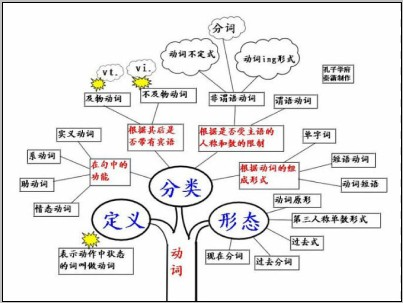
过去分词的概念:
过去分词一般表示完成和被动的动作,只有一种形式。即:动词原形加-ed构成。
如:fallen leaves 落叶
boiled water 开水
I heard the door closed. 我听见门被关上了。
过去分词与现在分词被动式的区别:
两者均可表示被动,其区别主要在于它们所表示的时间概念不同,但有时它们也可表示相同的意思。
如:Written in haste, the book has many mistakes. 这书因写得仓促,所以错误不少。
Being written in haste, the book has many mistakes. 这书因写得仓促,所以错误不少。
Having been written in haste, the book has many mistakes. 这书因写得仓促,所以错误不少。
有时虽然所表示的时间概念相同,但有细微区别:
如:Having been show the lab, we left. 被领着看了实验室后,我们就离开了。
过去分词的句法功能:
1、作定语:
如:I don't like the book written by Martin.
Our class went on an organized trip last Monday. 上周一我们班开展了一次有组织的旅行。
注意:当过去分词是单词时,一般用于名词前,如果是过去分词短语,就放在名词的后面。过去分词做定语相当于一个被动语态的定语从句。
2、过去分词作表语:
如:They were very excited at the news. 听到这个消息,他们非常激动。
The window is broken. 窗户破了。
They were frightened at the sad sight. 他们对眼前悲惨的景象感到很害怕。
注意:be+过去分词,如果表示状态是系表结构,如果表示被动的动作是被动语态。
区别:The window is broken.(系表)
The window was broken by the boy.(被动)
有些过去分词是不及物动词构成的,不表示被动,只表示完成。
如:boiled water(开水) fallen leaves(落叶) newly arrived goods(新到的货) the risen sun(升起的太阳) the changed world(变了的世界)
这类过去分词有:gone, come, fallen, risen, changed, arrived, returned, passed等。
3、过去分词作宾语补足语:
如:I heard the song sung several times last week. 上周我听见这首歌被唱了好几次。
有时过去分词做with短语中的宾语补足语:
如:With the work done, they went out to play. 工作做完了,他们出去玩去了。
4、过去分词作状语:
如:Praised by the neighbours, he became the pride of his parents. 受到邻居们的表扬,他成为父母的骄傲。(表示原因)
Onceseen, it can never be forgotten. 一旦它被看见,人们就忘不了。(表示时间)
Given more time, I'll be able to do it better. 如果给予更多的时间,我能做得更好。(表示条件)
Though told of the danger, he still risked his life to save the boy. 虽然被告之危险,他仍然冒生命危险去救那个孩子。(表示让步)
Filled with hopes and fears, he entered the cave. 心中充满了希望与恐惧,他走进山洞。
5、过去分词与逻辑主语构成独立主格:
如:All books returned at the end of the term, the library assistant was satisfied. 所有的书期末时都还了,图书管理员很高兴。
The field ploughed, he began to spread seed. 地耕好了,他开始撒种子。
现在分词与过去分词的区别:
1、分词作表语:
分词做表语有两种情况,一种是现在分词做表语,一种是过去分词做表语,这两者区别是考试中经常考到的地方。一般来说,表示心理状态的动词如excite,interest等都是及物动词,汉语意思不是“激动”,“高兴”,而是“使激动”、“使高兴”,因而现在分词应该是“令人激动的”、“令人高兴的”,过去分词则是“感到激动的”和“感到高兴的”。所以,凡表示“令人……的”都是-ing形式,凡是表示“感到……”都用-ed形式。换句话说,若人对……感兴趣,就是somebody is in terestedi n...,若人/物本身有兴趣时,就是说sb./sth. is interesting。这类词常见的有:
interesting 使人感到高兴—interested感到高兴的
exciting令人激动的—excited感到激动的
delighting令人高兴的—delighted感到高兴的
disappointing令人失望的—disappointed感到失望的
encouraging令人鼓舞的—encouraged感到鼓舞的
pleasing令人愉快的—pleased感到愉快的
puzzling令人费解的—puzzled感到费解的
satisfying令人满意的—satisfied感到满意的
surprising令人惊异的—surprised感到惊异的
worrying令人担心的—worried感到担心的
如:Travelling is interesting but tiring. 旅行是有趣的,但是使人疲劳。
The pupils will get confused if they are made to learn too much. 如果要学生学得太多,他们会感到糊涂的。
The game is exciting. (现在分词作表语)
We were excited at the news. (过去分词作表语)
2、分词作定语:
分词作定语时有下面几个特点:
1)现在分词表示主动意义,过去分词一般表示被动含意。
2)现在分词表示正在进行,过去分词表示状态或做完(完成)的事。
如:He rushed into the burning house. 他冲进了正在燃烧着的房子。
The child standing over there is my brother. 站在那儿的男孩子是我弟弟。
The room facing south is our classroom. 朝南的房间是我们的教室。
He is an advanced teacher. 他是个先进教师。
3)下列不及物动词也以过去分词形式做定语或表语,但不具有被动意义,这点要注意:
departed, elapsed, faded, fallen, gone, frown-up, retired, returned, risen, set, vanished, much-traveled, newly-arrived, recently-come
3、分词作状语:
现在分词做状语与过去分词做状语的最主要区别在于两者与所修饰的主语的主动与被动关系的区别。
1)现在分词作状语时,现在分词的动作就是句子主语的动作,它们之间的关系是主动关系。
如:He went out shutting the door behind him. 他出去后将门随手关上。
Not knowing what to do, he went to his parents for help. 由于不知如何办是好,他去找父母帮忙。
Smiling, they came in.
2)过去分词作状语时,过去分词表示的动作是句子主语承受的动作,它们之间的关系是被动关系。
如:Cleaned, the room looks nice.
Given more attention, the trees could have grown better. 如果对这些树多关心一些,它们本来会长得更好。
Faced with difficulties, we must try to overcome them. 在遇到困难的时候,我们必须设法克服。
非限制性定语从句的概念:
非限制性定语是对被修饰名词或代词的附加说明,它不是必需的,如果去掉,也不会影响句子的意思,它与被修饰名词之间通常用逗号分开。
如:The travellers, knowing about the floods, took another road. 游客们知道发了大水,都改道走了。
The boys, wanting to play football, were disappointed when it rained. 那些男孩子想踢足球,因为下雨感到失望。
非限制性定语从句用法:
1、引导非限定性定语从句时,只能用which(不用that)。
例如:Heat is another form of energy, which is as important as other kinds of energy.
热是另一种形式的能量,与其他形式的能量一样重要。 (从句表补充说明,而且关系代词which不能换成that。)
2、引导非限定性定语从句的which可以指代前面的先行词,也可以指前面整个句子的含义。
例如:That Peter will marry Alice, which has not been announced yet, has spread around.
彼特要娶爱丽斯这件事还没宣布,却已传得沸沸扬扬。(句子中的which指“彼特要娶爱丽斯”这整个句子的意思。)
3、除which外,还可用when,where,who等关系代、副词引导非限定性定语从句。
例如:After graduation, I decided to stay in Chongqing, where I spent my childhood and four years of college life.
毕业后,我决定留在重庆,在那里我曾度过了我的童年和四年大学生活。
Albert Einstein left Germany for the United States during World WarII, when Jews were badly treated in Germany.
第二次世界大战期间,爱因斯坦离开德国去了美国,那时犹太人在德国受到不好的对待。
4、在限定性定语从句中作宾语时,引导词可以省略,但引导非限定性定语从句的关联词不能省。
如:He was eager to go to the hospital to see his stepmother, whom he loved and respected as his own mother.
他急于想去医院看望他的继母,他把他的继母当作亲生母亲一样热爱和尊敬。
The American journalist(whom/who) the announcer mentioned in the news broadcast is said to have been killed by the gangsters.
播音员在新闻广播中提到的那位美国记者据说已经被匪徒杀害了。
两例中的关系代词都在从句中作宾语。由于第二例是限定性定语从句,可以省略关系代词;第一例中的引导词不能省略,因为它引导的是非限定性定语从句。
5、表示“正如”的含义时,通常用as引导非限定性定语从句,也可用which引导;但置于句首时,只能用as引导。
如:China has basically succeeded in defeating SARS, which/as we have expected.
正如我们所预料的那样,中国已基本上战胜了“非典”。
As is well known to everybody, Tai wan is an inseparable part of China.
众所周知,台湾是中国不可分割的一部分。
但是当非限定性定语从句是否定含义时,就只能用which(而不用as)引导。
如:He didn't win the championship, which I hadn't expected.
他没获得冠军,这一点是我没预料到的。
非限制性定语丛句中as, which的区别:
1、which引导非限制性定语丛句代表前面的整个句子的时候,一般是对主句的结果的说明。
如: He grows too fast, which makes him taller than his classmates.
2、as引导非限制性丛句代表前面整个句子时一般来讲丛句的谓语动词有三种:
A. 含有be动词:
如:He failed the exam, as is natural.
B. 实意动词的被动形式:
如:As is reported, the fire caused a great loss.
C.感官动词和意识类动词如:
如:see, hear, notice, know, learn, realize 等。
As you know, I am a teacher.
3、as可翻译为正如,它引导的丛句可位于主句之前,也可位于主句之后;which引导的该丛句只能位于主句之后。
例1:__A___he realized, I was very useful to him.
例2:This elephant is like a snake, ___A__anybody can see.
例3:The sun gives us light and heat, __B___makes the plan tgrow well.
A. As(as)
B. which
C. that
D. who
限定性定语从句与非限定性定语从句的区别:
|
定 |
限制性定语从句 | 非限制性定语从句 |
| 1、不能省略,如果省略整个句子意思不完整。 | 可以省略,如果省略整个句子意思仍然完整。 | |
| 2、可以用that引导。 | 不可以用that引导。 | |
| 3、关联词有时可以省略。 | 关联词不可以省略。 | |
| 4、不用逗号把它和句子的其他部分隔开。 | 用逗号把它和句子的其他部分隔开。 | |
| 5、只能修饰先行词。 | 可以修饰先行词,也可以修饰整个句子或句子的一部分。 |
非限制性定语从句的关系词:
| 关系代词 | 指代对象 | 指代人 | 指代物 |
| 主格 | who | which, as | |
| 宾格 | whom | which, as | |
| 所有格 | of, whom, whose | which, of which, whose | |
| 关系副词:when, where | |||
非限定性定语从句的使用规则及注意事项:
1、which引导的非限定性定语从句是用来说明前面整个句子的情况或主句的某一部分。
2、在引导限定性定语从句时,that有时相当于in which, at which, for which或at which。其中,介词的选用,依据从句中的动词所需搭配的介词来选用。例句:
① Attitudes towards day dreaming are changing in much the same way that(inwhich)attitudes towards night dreaming have changed.
人们对白日做梦的态度正在改变,这与人们对夜间做梦的看法的变化有非常相似之处。
② I like the music for the very reason that(for which) he dislike it.
我出于某种原因喜欢这种音乐,而他恰恰与我相反。
③ We arrived the day that(on which) they left.
刚好我们到的那天他们走了。
3、as有时也可用作关系代词。
4、在非限定性定语从句中,关系词不能用that。
与“短文改错。 Three young pioneers were playing while they s...”考查相似的试题有:
- 7. Our older generation used to advise us not to build ____ in the air, but that’s not realistic at all.A.atticsB.c...
- It is the for westerners to celebrate Christmas.A.habitB.mannerC.customD.way
- -----The film is, I have to say, not a bit interesting.------Why? It’s ______________ than the films I have ever see...
- There are a lot of ___ flowers in that park.A.little red beautifulB.beautiful little redC.little beautiful redD.r...
- Three college students were accused ______ causing the accident on purpose and sentenced to two years in prison.A.of...
- It looks________you are ill.You should go to see the doctor.[ ]A.asB.as thoughC.whichD.whether
- It is so difficult a question_______ none of the kids could work it out.A.asB.thatC.whichD.X
- . Not far from the club, there is a garden, its owner __________ in it ___________ bridge with his children every aft...
- —The state of illness is complicated.We need an experienced doctor.—Whom would you like to have____?A.sent forB.s...
- He requested that all the soldiers _____ the news secret.A.keepB.keptC.keepingD.to keep